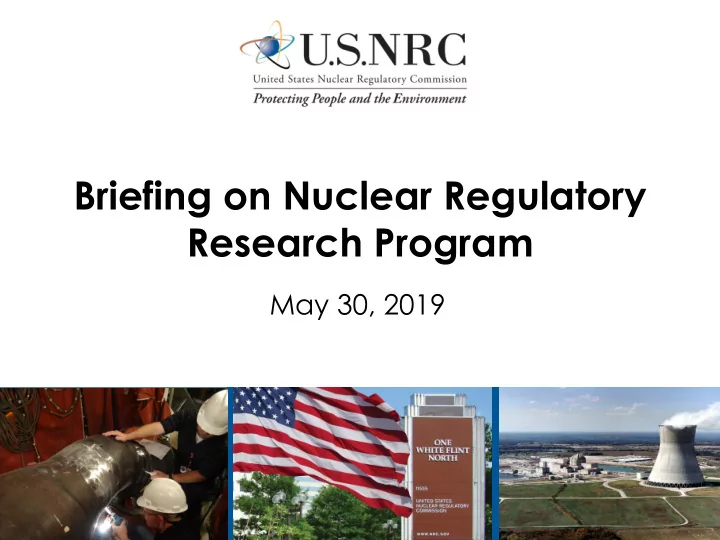

Briefing on Nuclear Regulatory Research Program May 30, 2019
Agenda • Steven West – Introduction • Raymond Furstenau – Strategic Overview of the Research Program • Ho Nieh – Research Benefiting Operating Reactor Business Line Decisions • Kimberly Webber – Cooperation on Advanced Reactors and Accident Tolerant Fuel • Raj Iyengar – Technical Basis Development for Supporting Regulatory Decisions • John Nakoski – Advancing Risk-Informed Decision-Making 2
Strategic Overview of the Research Program Raymond Furstenau Director Office of Nuclear Regulatory Research
Research at a Glance RES – FY 2019 Budget by Business Line Operating Reactors 2% $33.8M and 183 FTE 13% New and Advanced Reactors $6.5M and 21 FTE Nuclear Materials, Fuel Storage, and Decommissioning $0.9M and 4 FTE 85% Total Budget $79.6M (includes $41.2M in contracts and 208 FTE) 4 *$15M for the Integrated University Program is not included
Be Ready for New Technology • Research is necessary to support licensing and oversight of innovative technologies and designs Lead test assembly containing accident tolerant fuel (ATF) rods being loaded at Southern Nuclear's Edwin I. Hatch Nuclear Plant (courtesy of Southern Nuclear). • Activities are a balance of confirmatory and forward-looking research to ensure readiness 5
Importance of External Engagement • Providing transparency of research activities internally and externally • Significant leverage through domestic and international collaborations RIC Session – Role of Research in Transforming 6 the Regulatory Environment
Performing Research that Matters • Initiated program reviews of research activities to support strategic alignment with the business lines • Focus efforts to ensure we are doing the right Program Review on Engineering Research research at the right time, with the appropriate priority 7
Improving Decision Making Proactive Regulatory Research Confirmatory Analysis Focus on Forward-looking Reduce research lays the What Our role as an Uncertainties foundation to independent Matters By increasing our support innovative regulator is body of technologies strengthened by knowledge and tools and analyses understanding, that aid timely we can reduce decision making unnecessary conservatism in our rules and guidance 8
Research Benefiting Operating Reactor Business Line Decisions Ho Nieh Director Office of Nuclear Reactor Regulation
Closing GSI-191 because safety has been improved and the low safety significance of in-vessel effects 1 0
Better modeling of FLEX using Operating Experience and Human Reliability Analysis 1 1
Reactor Oversight Process (ROP) Decision Making Relies on Research • SPAR models enable independent assessment of safety-significance – Significance Determination Process – Event response – Emergent issues • ROP Enhancement Project requested research to confirm that, in general, the level of safety has improved over the last 20 years 1 12 2
Research Cooperation on Advanced Reactors And Accident Tolerant Fuel Kimberly A. Webber Deputy Director Division of Safety Analysis
“BE READY” ATTITUDE • Improved mission value through cooperation – Delivers cost savings – Reduces duplication of effort – Builds staff expertise – Brings regulatory perspectives to new ideas 1 4
Capitalizing on Partnerships to Support Licensing of Accident Tolerant Fuels (ATF) • Numerous interactions with fuel vendors • Obtaining data from DOE research programs Idaho National Laboratory - Advanced Test Reactor • Gaining insights from EPRI on safety of ATF and operational flexibilities • Developing insights on fuel safety criteria through international partnerships 1 5
Strategic Research for Advanced Reactor Licensing • Use of DOE’s codes and expertise fill gaps in NRC computation capabilities Use of DOE Computer Codes • Building staff expertise in sodium fast reactors through DOE’s Versatile Test Reactor Program Versatile Test Reactor • Accelerating NRC knowledge about graphite through cooperation with the United Kingdom 1 High temperature Gas Reactor 6
Technical Bases Development for Supporting Regulatory Decisions Raj Iyengar Branch Chief Division of Engineering
Integrating Knowledge into Engineering Solutions Readiness for subsequent license renewal • Identified technical issues proactively • Coordinated with DOE and EPRI • Developed joint research roadmaps & separate research programs • Reduced uncertainties; increased knowledge • Supported issuance of guidance 1 8 Cables Vessel Internals – Baffle Bolt Concrete
Delivering Efficiency Expertise in Action Reactor Pressure Vessel Probabilistic Fracture Mechanics (PFM) Assessment Code (FAVOR) Risk-informed efforts throughout • Reduction of in-service • metallic component systems inspection burden (BWR circumferential welds) Evaluation of reactor • pressure vessel issues (Doel/Tihange) on US fleet Development of Alternate • Pressurized Thermal Shock Rule Extremely Low Probability of Rupture (xLPR) • Leak-Before-Break Applications 1 19 9
Forging the Future Evaluating New Technologies Advanced Reactors: Materials/Components • International Operating Experience • Technical issues identification and resolution • Flexible approaches to material qualification • Advanced Manufacturing • Electromagnetic Pulse • Thimble Plugging Device 2 0
Advancing Risk-Informed Decision-Making John A. Nakoski Chief, Probabilistic Risk Assessment Branch Division of Risk Analysis
Expanding the Use of Risk Insights in NRC Decision-Making • Operating, New, and Advanced Reactors • Cyber and Physical Security, Digital Systems, Materials • Level 3 Probabilistic Risk Assessment (PRA) • State-of-the-Art Reactor Consequence Analysis 2 2
Focusing Resources on Mission Important Issues • Advancing Consensus Standards and Methods • Applying risk tools to Advanced Reactors • Enabling Knowledge Management and embracing change 2 3
Delivering Tools, Methods, and Data • Improving realism in risk tools and models to better prioritize activities • Increasing understanding of uncertainties and safety margins • Enhancing PRA models for Advanced Reactors 2 4
Wrap-up • Collaboration and leverage are more important now than ever before • Research activities need to keep pace with innovation and regulatory needs • Thoughtful investment is needed to maintain tools, methods, knowledge, and to solve technical issues 2 5
Acronyms • ATF - Accident Tolerant Fuel • BWR - Boiling Water Reactor • FLEX – Diverse and Flexible Coping Strategies • GSI – Generic Safety Issue • PRA - Probabilistic Risk Assessment • ROP – Reactor Oversight Process • SPAR – Standardized Plant Analysis Risk 2 6
Recommend
More recommend